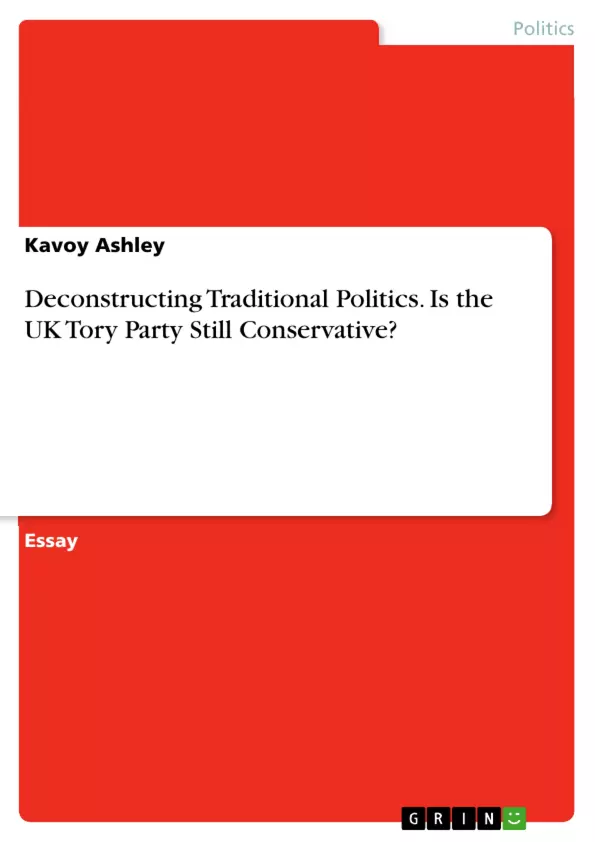This paper critically examines the modern day phenomenon of Ideological Conservatism in accordance with the Conservatory Party of the United Kingdom. It does so by performing a cross reference between classical conservatism as proposed by Thomas Hobbes, with the present state of the party’s ideology. This process takes into account the historical, social, economic and political evolution of the ideology itself in a post French Revolutionary context, and how this has provided the foundation upon which modern day Neo-Conservatism is built.
Table of Contents
- Introduction
- CHAPTER I: 'New Right Politics' of the UK Conservative Party against traditional conservatism
- Principles of classical conservatism
- The presence of different ideological factions that go against traditional conservatism in the UK Party
- CHAPTER II: The UK Conservative Party represents the evolution of Conservatism
Objectives and Key Themes
This paper aims to analyze the extent to which the UK Conservative Party remains true to its traditional conservative roots in light of the adoption of "New Right" policies. It examines the evolution of the party's ideology and explores the tensions between traditional conservative principles and more recent ideological shifts.
- The principles of classical conservatism
- The impact of "New Right" politics on the UK Conservative Party
- The evolution of conservatism within the UK Conservative Party
- Ideological factions within the UK Conservative Party
- The relationship between tradition and change in conservative ideology
Chapter Summaries
CHAPTER I: 'New Right Politics' of the UK Conservative Party against traditional conservatism: This chapter explores the divergence between traditional conservatism and the modern-day application of conservative ideology within the UK Conservative Party. It begins by outlining the key tenets of classical conservatism, examining its attitudes towards society (emphasizing tradition, human imperfection, and the organic nature of society), its political practices (highlighting the importance of authority and social contract theory), and its concept of government. The chapter then contrasts these traditional principles with the emergence of new ideological factions within the UK Conservative Party, showcasing the tension between traditional conservatism and the influence of "New Right" politics. This contrast sets the stage for the central argument of the paper, exploring whether the modern party remains fundamentally conservative.
CHAPTER II: The UK Conservative Party represents the evolution of Conservatism: This chapter (presumably) argues that despite the significant changes brought about by the "New Right," the UK Conservative Party fundamentally remains conservative. It likely analyzes the party's mandate, demonstrating how its core principles, though adapted and evolved, persist through the integration of seemingly contradictory ideologies like unionism and economic liberalism. The chapter would likely delve into the hybrid nature of the "centre-right" party and explain how it reconciles its traditional foundations with its more modern iterations. This chapter would therefore serve as a counterpoint to Chapter I, ultimately reaching the paper's concluding argument on the party's overall conservative nature despite its evolution.
Keywords
UK Conservative Party, conservatism, New Right, traditional conservatism, economic liberalism, unionism, ideological factions, political ideology, Margaret Thatcher, David Cameron, evolution of conservatism.
Frequently Asked Questions: Analysis of the UK Conservative Party and its Evolution
What is the main topic of this academic preview?
This preview presents an analysis of the UK Conservative Party, examining the extent to which its current policies align with traditional conservative principles. It focuses on the influence of "New Right" politics on the party's ideology and explores the tensions between tradition and change within the party.
What are the key themes explored in this paper?
The key themes include: the principles of classical conservatism; the impact of "New Right" politics on the UK Conservative Party; the evolution of conservatism within the UK Conservative Party; ideological factions within the UK Conservative Party; and the relationship between tradition and change in conservative ideology.
What does the preview include?
The preview provides a table of contents, objectives and key themes, chapter summaries, and keywords. It offers a comprehensive overview of the paper's structure and content.
What is discussed in Chapter I: "'New Right Politics' of the UK Conservative Party against traditional conservatism"?
Chapter I contrasts traditional conservative principles (including its views on society, political practices, and the role of government) with the influence of "New Right" politics within the UK Conservative Party. It examines the tension between these differing ideological factions.
What is the likely argument presented in Chapter II: "The UK Conservative Party represents the evolution of Conservatism"?
Chapter II likely argues that despite the influence of "New Right" policies, the UK Conservative Party remains fundamentally conservative. It probably analyzes how the party's core principles have adapted and evolved while incorporating seemingly contradictory ideologies like unionism and economic liberalism.
What are some keywords associated with this paper?
Keywords include UK Conservative Party, conservatism, New Right, traditional conservatism, economic liberalism, unionism, ideological factions, political ideology, Margaret Thatcher, David Cameron, and the evolution of conservatism.
What is the overall aim of this research paper?
The paper aims to analyze the relationship between traditional conservative principles and the adoption of "New Right" policies within the UK Conservative Party, assessing the extent to which the party remains true to its historical roots.
Who would find this research relevant?
This research would be relevant to students, academics, and researchers studying political science, British politics, conservative ideology, and the history of the UK Conservative Party. It may also be of interest to those interested in the evolution of political ideologies and the interplay between tradition and change.
- Quote paper
- Kavoy Ashley (Author), 2014, Deconstructing Traditional Politics. Is the UK Tory Party Still Conservative?, Munich, GRIN Verlag, https://www.grin.com/document/285681



